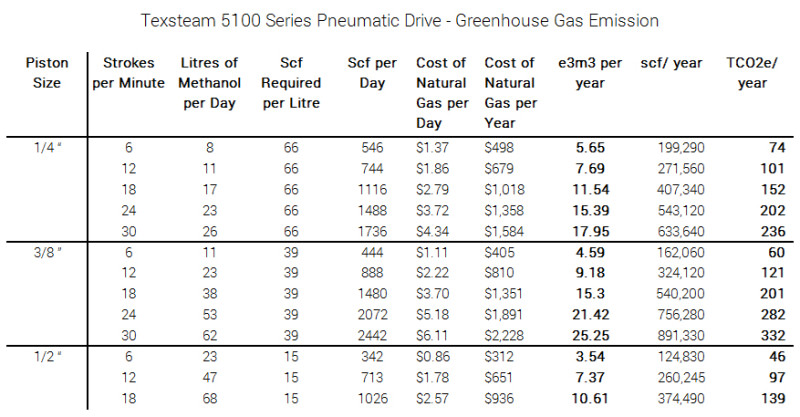Greenhouse Gas Emission

Pipeline injection of various production enhancement chemicals is crucial to an uninterrupted flow of product to market. Industries worldwide have benefited from system performance improvements through evolution and innovation. This is equally true of positive displacement chemical injection pump technology for the oil and gas industry.
Responsible stewardship of our Planet is front and centre. In the past, oil & gas operations could result in chemical leaks, drive gas venting and surplus chemical injection. Today these environmental concerns can be greatly reduced or eliminated with the deployment of currently available and field proven technology.
Remote oil and gas well locations in Canada offer numerous technical challenges for chemical injection pump technology. Traditionally sweet natural gas wells provide the pneumatic “drive gas” to power chemical injection pumps. Generally, in sour gas well applications, sweet gas is piped in or propane is imported to site, at considerable added cost, to power the pumps. In all cases the drive gas is then vented directly to the atmosphere. Historically these pneumatic drive solutions were readily available, cost effective and mechanically sound. However heightened environmental concerns and technological innovations have made these practices questionable.
Alternatives to the pneumatic drive include replacement with solar powered electric drive systems for total greenhouse gas emission elimination. These systems are technically sound and field proven. However they are costly. Other solutions include reduced greenhouse gas emission pumps. These are less expensive than electric drive pumps but still costly. Finally MCI Solutions manufactures an alternate fluid end for the 5100 Series pneumatic drive. Depending on the application these field retrofittable fluid ends can reduce greenhouse gas emission by 50%.
The addition of an FMT fluid end to one existing 5100 Series pneumatic chemical injection pump can save thousands of dollars per year, reduce environmental discharging, increase chemical delivery performance and pay for their implementations within months. Further the savings are cumulative amounting to tens of thousands of dollars over the life of each well.
The FMT fluid end is standard on all MCI electric drives. Implement a transition plan and start working towards zero greenhouse gas emissions. Add the FMT to your existing pneumatic drives and reduce greenhouse gas emission by up to 50%. When it makes sense convert the drives from pneumatic to electric, reuse your FMT fluid end on the new electric drives, and eliminate the remaining greenhouse gas emissions. After that simply collect your carbon credits.
Click here to learn more about the MCI FMT fluid end.
Notes for the table, Texsteam 5100 Series Pneumatic Drive – Greenhouse Gas Emission, shown on top.
Cost of operation assumes a natural gas price of $2.50 CDN per 1000scf (1,000,000Btu).
Calculations based on 1” stroke at 500 psi injection pressure and an optimized pump.
Analysis based on Texsteam brochure (7.07).
CO2e
Mole FractionCO2: 0.491%
Mole FractionCH4: 92%
DensityCO2: 5.295E-05 t CO2 / cubic feet
DensityCH4: 1.926E-05 t CH4 / cubic feet
GWPCO2: 1 t CO2 equivalent
GWPCH4: 21 t CO2 equivalent
